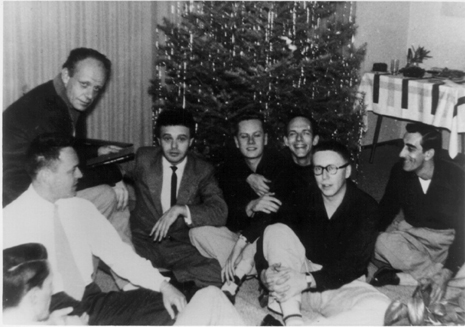The first meeting of THE MATTACHINE SOCIETY; As Senator Joseph McCarthy railed against homosexuals in the State Department, Harry Hay, working on the Henry Wallace presidential campaign in 1948, wrote a startling document, declaring homosexuals an oppressed minority. While the idea is widely accepted today, at the time the notion of homosexuals as a minority was considered absurd. But it was this key concept that would eventually bring the Gay and Lesbian rights movement together.
Harry’s platform for the Wallace campaign was never voted on, but he remained determined to organize homosexuals to fight for their equal rights. Two years later, he met Rudi Gernreich (later to be the noted fashion designer) and together they canvassed beaches in the Los Angeles area known as homosexual gathering places, inviting people to a discussion group about the just released Kinsey Report.
In November 1950, Harry showed the plank written for the Wallace campaign to Bob Hull, a student in his Southern California Labor School class. Bob shared the document with two of his friends, Chuck Rowland and Dale Jennings, and on November 11, 1950, the five met for the first time to discuss forming a political group that would later become the Mattachine Society. All of the founding members identified themselves as leftist. The group meets again two days later, on Nov. 13th.
Given the fearful political climate, Mattachine Society meetings often took place in secret with members using aliases. Like the Communist Party, the organization was organized in a cell structure that was non-centralized so that should a confiscation of records occur only limited information would be available to the authorities.
Over the course of the next two years, the Mattachine Society worked to organize and increase regional chapters throughout most of Southern California, but it was not until the arrest of member Dale Jennings on police entrapment charges that the Mattachine Society took on its first political battle. Police entrapment was a common form of harassment against homosexuals during that period. suspects’ names were printed in the newspapers, which caused many to lose their jobs and become estranged from their families. By standing up to defend Jennings, the Mattachine Society not only rose to the defense of one of their members, but also took on the notorious Los Angeles Police Department for its pattern and practice of homosexual harassment.
